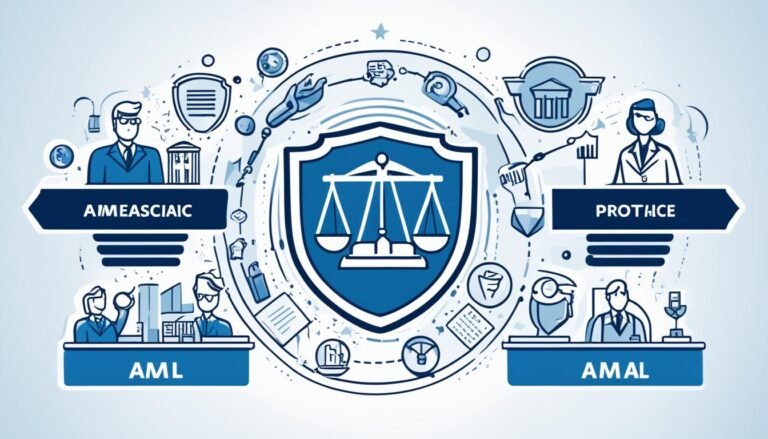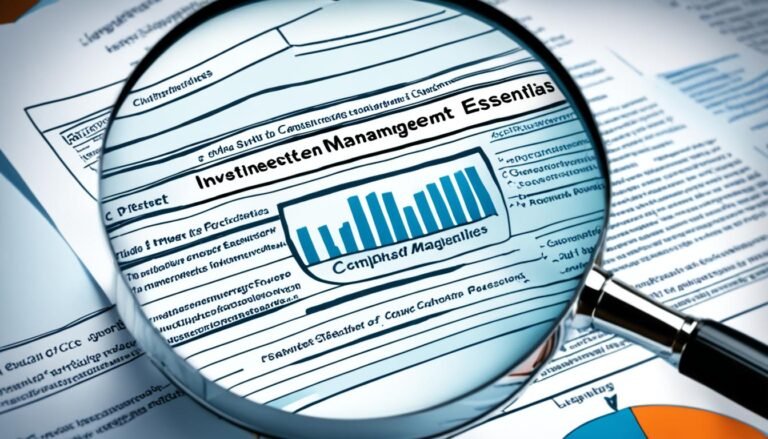2023 IFRS Updates: Latest Financial Standards
Did you know that International Financial Reporting Standards (IFRS) updates play a critical role in shaping accounting regulations and financial reporting practices? Keeping up with the ever-evolving IFRS standards is essential for businesses around the world to ensure compliance and accurate financial reporting.
As we approach 2024, it’s important for IFRS preparers to be aware of the upcoming amendments in income taxes, debt with covenants, sale-and-leaseback transactions, and supplier finance arrangements. However, the spotlight for 2023 is on the implementation of IFRS 17, which introduces a new accounting model for insurance contracts. These changes will have a significant impact on financial statements and reporting obligations.
In this article, we provide an overview of the latest changes to IFRS Accounting Standards and their implications for financial statements. We will dive into the upcoming updates, the new accounting model for insurance contracts, and the importance of staying up to date with IFRS Interpretations Committee Agenda Decisions. Let’s explore the world of IFRS updates and their impact on financial reporting.
Key Takeaways:
- IFRS updates play a pivotal role in accounting regulations and financial reporting practices.
- Understanding and complying with IFRS standards is crucial for businesses worldwide.
- The focus for 2023 is on the implementation of IFRS 17, introducing a new accounting model for insurance contracts.
- Upcoming amendments in income taxes, debt with covenants, sale-and-leaseback transactions, and supplier finance arrangements will impact financial reporting.
- Staying informed about IFRS Interpretations Committee Agenda Decisions is essential for compliance.
Overview of IFRS Accounting Standards Updates
The International Accounting Standards Board (IASB) plays a crucial role in setting and issuing authoritative guidance on IFRS Accounting Standards, ensuring consistent financial reporting practices worldwide. Keeping up with the latest updates is essential for entities to comply with these standards and provide accurate financial statements.
The IFRS Institute serves as a trusted resource for understanding the new guidance provided by the IASB. It offers comprehensive information on the latest changes to IFRS Accounting Standards and conducts detailed comparisons with US Generally Accepted Accounting Principles (GAAP), assisting entities in maintaining compliance with international reporting requirements.
The content provided by the IFRS Institute is organized based on the effective dates of the updates. This enables preparers to easily access and grasp the most relevant information for their reporting periods, ranging from the upcoming changes in 2023 to future updates that will shape financial reporting in the coming years.
Implementing IFRS standards necessitates timely compliance with all IFRS Interpretations Committee Agenda Decisions, as these decisions provide vital interpretations and clarifications on the application of IFRS Accounting Standards. Staying informed about these decisions is crucial to ensure accurate and compliant financial reporting.
To help entities understand the impact of the updates and changes in IFRS Accounting Standards, the IFRS Institute provides practical examples, case studies, and implementation guidance. This valuable resource equips preparers with the necessary knowledge and tools to navigate the complexities of these standards and adapt their accounting practices accordingly.
Comparison of IFRS Accounting Standards with US GAAP
“The IFRS Institute offers a comprehensive comparison of IFRS Accounting Standards and US GAAP, allowing entities to assess the differences in financial reporting requirements between the two frameworks. This comparison serves as a valuable reference for multinational entities operating in jurisdictions that follow different reporting standards, helping them align their financial statements with the respective requirements.”
When it comes to accounting for insurance contracts, one of the notable updates in IFRS Accounting Standards is the implementation of IFRS 17. This accounting model introduces significant changes to ensure transparent and consistent reporting of insurance contracts across different jurisdictions. Entities must analyze the impact of IFRS 17 on their financial statements and adapt their accounting policies accordingly.
In summary, staying updated on the latest IFRS Accounting Standards updates is crucial for entities to maintain compliance with international financial reporting requirements. By leveraging the resources provided by the IFRS Institute, preparers can navigate the complexities of these standards, ensure accurate and transparent financial statements, and provide stakeholders with reliable financial information.
Key Changes in IFRS Accounting Standards for 2023
In 2023, preparers need to be aware of key amendments in IFRS Accounting Standards that focus on income taxes, debt with covenants, sale-and-leaseback transactions, and supplier finance arrangements. These changes will significantly impact the accounting treatment and disclosures for these specific areas.
Entities subject to IFRS standards must stay updated on these changes and ensure their compliance with the new requirements. With the implementation of these amendments, financial statements will undergo modifications to accurately reflect the updated accounting standards.
Income Taxes
The amendments to income taxes under IFRS Accounting Standards aim to provide clearer guidance on the recognition and measurement of deferred tax assets and liabilities. These changes will ensure that entities account for income taxes in a more consistent and transparent manner.
Debt with Covenants
IFRS Accounting Standards have introduced amendments to debt with covenants to address the complexities involved in analyzing and assessing financial liabilities. These changes will provide more guidance on the accounting treatment and appropriate disclosures related to debt instruments.
Sale-and-Leaseback Transactions
The amendments in sale-and-leaseback transactions aim to simplify and provide clearer guidance on the accounting treatment and classification of these transactions. Entities will need to carefully assess the impact of these changes to ensure compliance with the updated standards.
Supplier Finance Arrangements
Changes to supplier finance arrangements under IFRS Accounting Standards aim to provide more clarity and transparency in accounting for these arrangements. Entities will have to evaluate and adjust their accounting practices to reflect the updated standards for supplier finance arrangements.
These amendments in income taxes, debt with covenants, sale-and-leaseback transactions, and supplier finance arrangements reflect the ongoing efforts to enhance the quality and comparability of financial reporting under IFRS Accounting Standards. Entities should carefully review the new requirements and make any necessary adjustments to their financial statements to ensure compliance.
By staying informed and proactively adapting to these changes, entities can maintain accurate and reliable financial reporting practices that align with the latest IFRS Accounting Standards.
Implementation of IFRS 17: New Accounting Model for Insurance Contracts
The adoption of IFRS 17 in 2023 brings significant changes to the accounting for insurance contracts. This new accounting model is designed to enhance transparency and consistency in reporting within the insurance industry.
IFRS 17 introduces a standardized approach that replaces the multiple existing models used for insurance contract accounting. It aims to provide a clearer and more accurate representation of insurers’ liabilities and ensures better comparability across organizations.
Under the previous accounting standards, different methods were utilized, leading to inconsistency and difficulty in understanding the financial position of insurance companies. With the implementation of IFRS 17, there will be a uniform framework that aligns the recognition, measurement, presentation, and disclosure of insurance contracts.
Entities will need to thoroughly assess the impact of IFRS 17 on their financial statements. The implementation process will require diligent examination of existing contracts, analysis of future cash flows, and the development of systems that can handle the new requirements.
Insurers will also need to make necessary adjustments to ensure compliance with the new accounting standards. This may involve changes to internal processes, systems, and policies to accommodate the revised guidelines.
Key Features of the IFRS 17 Accounting Model
- Measurement of insurance contracts based on current estimates of future cash flows.
- Recognition of a contractual service margin, representing the unearned profit on insurance contracts.
- Presentation of insurance contracts as a separate line item on the balance sheet.
- Disclosure of key information about insurance contracts, including risk exposure and sensitivity analysis.
IFRS 17 will provide users of financial statements with a more accurate representation of an insurer’s financial position, performance, and risk exposure. This improved transparency will help stakeholders make informed decisions and assess the financial health of insurance companies more effectively.
“The implementation of IFRS 17 marks a significant milestone in the accounting for insurance contracts. The new accounting model will promote consistency, transparency, and comparability in the reporting of insurance contracts, benefiting both insurers and stakeholders.”
Comparison with Previous Insurance Contract Accounting
| Previous Standards | IFRS 17 |
|---|---|
| Multiple accounting models | Uniform accounting model |
| Inconsistent recognition and measurement | Consistent recognition and measurement |
| Limited disclosure requirements | Enhanced disclosure requirements |
The table above highlights the key contrasts between the previous insurance contract accounting standards and the new IFRS 17 model. The transition to a standardized approach will lead to increased understanding, comparability, and trust in the reporting of insurance contracts.
IFRS Interpretations Committee Agenda Decisions
Keeping up with the updates to IFRS Accounting Standards is essential for entities to maintain compliance and ensure accurate financial reporting. In addition to these updates, entities must also pay attention to the IFRS Interpretations Committee Agenda Decisions which provide guidance on specific accounting issues and interpretations of the standards.
The IFRS Interpretations Committee is the body responsible for providing timely and consistent guidance on the application of IFRS Accounting Standards. Their decisions play a crucial role in clarifying complex accounting matters and ensuring uniform interpretations across different jurisdictions.
Implementing the IFRS Interpretations Committee Agenda Decisions helps entities navigate the challenges that arise when applying the standards to unique transactions or scenarios. By considering these decisions in their financial reporting process, entities can avoid potential misinterpretations and ensure compliance with the standards.
Staying informed about the latest IFRS Interpretations Committee Agenda Decisions is vital for financial preparers and auditors alike. It allows them to be aware of any updated guidance, clarifications, or changes in interpretations that could impact their financial reporting obligations.
“The IFRS Interpretations Committee Agenda Decisions provide valuable insights into the practical implications of applying IFRS Accounting Standards. By following these decisions, entities can enhance the accuracy and reliability of their financial information.”
Entities can access the IFRS Interpretations Committee Agenda Decisions on the official website of the International Financial Reporting Standards Foundation. It is advisable to periodically review these decisions to stay up to date with the latest guidance and ensure compliance with the requirements of IFRS Accounting Standards.
Impact on Financial Statements
Complying with the IFRS Interpretations Committee Agenda Decisions has a direct impact on the preparation and presentation of financial statements. It ensures that entities account for specific transactions, events, or uncertainties in a manner consistent with the guidance provided by the committee.
By considering the decisions in their financial statements, entities can provide users of financial information with accurate and relevant disclosures. This transparency helps stakeholders make informed decisions and assess the financial performance, position, and cash flows of the entity.
| Benefits of Implementing IFRS Interpretations Committee Agenda Decisions | Considerations when Implementing IFRS Interpretations Committee Agenda Decisions |
|---|---|
|
|
Overall, entities should prioritize implementing the IFRS Interpretations Committee Agenda Decisions alongside the updates to IFRS Accounting Standards. This ensures a comprehensive and accurate financial reporting process that aligns with the latest guidance and promotes transparency in financial information.
On the Radar: Future Changes to IFRS Standards
In addition to the current updates, it’s crucial for entities to keep an eye on future changes to IFRS standards. The IFRS Foundation work plan outlines upcoming projects that will shape the landscape of financial reporting. These projects include the introduction of a new standard for the presentation of financial statements and anticipated amendments to the financial instruments guidance in IFRS 9 and IFRS 7.
The presentation of financial statements is a fundamental aspect of financial reporting. The future changes to the standard intend to enhance the transparency and understandability of financial statements, ensuring that users can make informed decisions based on reliable information. Entities should familiarize themselves with the proposed changes and be prepared to align their reporting practices accordingly.
Furthermore, the anticipated amendments to the financial instruments guidance in IFRS 9 and IFRS 7 signal the ongoing commitment of the IFRS Foundation to align with industry developments and address emerging challenges. Financial instruments play a critical role in the global economy, and the proposed amendments aim to ensure the accurate representation and appropriate measurement of these instruments in financial statements.
Stay ahead of the curve by monitoring the progress of these future changes to IFRS standards. By proactively evaluating the potential impact on financial reporting, entities can position themselves to navigate the evolving landscape successfully.
IFRS Sustainability Standards
While not covered in detail in this article, it is important to note that the International Sustainability Standards Board has released its first two standards in 2023. These standards focus on sustainability reporting and should be considered by entities alongside IFRS Accounting Standards to ensure comprehensive and transparent reporting.
Adopting IFRS Sustainability Standards allows companies to showcase their commitment to sustainable practices and transparent reporting, aligning with global initiatives such as the United Nations Sustainable Development Goals. These standards provide a consistent framework for reporting on environmental, social, and governance (ESG) matters, enabling stakeholders to evaluate a company’s impact on sustainability factors and make informed decisions.
“The integration of IFRS Sustainability Standards with traditional financial reporting brings transparency to a broader set of performance indicators and helps investors assess the long-term value creation of companies.” – Jane Smith, Chief Sustainability Officer at XYZ Corporation.
Entities that embrace IFRS Sustainability Standards can benefit from improved management of sustainability risks and opportunities, enhanced stakeholder trust, and access to capital with a focus on sustainable investments. These standards facilitate comparability and consistency in sustainability reporting, promoting a level playing field for companies across industries and jurisdictions.
Key Features of IFRS Sustainability Standards:
- Guidance on measuring and reporting environmental impacts, including greenhouse gas emissions, water usage, and waste management.
- Disclosures on social aspects, such as workforce diversity, health and safety, and community engagement.
- Reporting on governance practices, including board composition, executive remuneration, and risk management.
By incorporating IFRS Sustainability Standards into their reporting practices, entities can demonstrate their commitment to sustainable development, meet the evolving needs of investors and stakeholders, and contribute to building a more sustainable and resilient global economy.
| Benefits of Adopting IFRS Sustainability Standards | Challenges of Implementing IFRS Sustainability Standards |
|---|---|
| Enhanced transparency and accountability | Establishing robust data collection and tracking systems |
| Improved decision-making for investors | Addressing reporting gaps and evolving regulatory requirements |
| Access to sustainable capital and investment opportunities | Integration of sustainability into existing financial reporting processes |
| Enhanced reputation and stakeholder trust | Educating internal stakeholders on sustainability reporting |
Implications of IFRS Updates on Reporting Entities
Entities subject to IFRS Accounting Standards need to carefully consider the implications of the updates on their financial reporting. These updates can have a significant impact on reporting entities and require an understanding of how they will affect financial statements.
One of the key considerations for reporting entities is the need to make necessary adjustments to their financial statements. This includes evaluating the changes brought about by the updates and ensuring that the financial statements accurately reflect the new requirements. As reporting entities analyze these updates, they must also assess the potential impact on their financial position, performance, and cash flows.
Compliance with the updated standards is another crucial aspect for reporting entities. By adhering to the latest IFRS Accounting Standards, entities can maintain regulatory compliance and meet the expectations of stakeholders. Compliance ensures that financial statements are prepared in accordance with the applicable standards, providing transparency and reliability in financial reporting.
Reporting entities should also consider leveraging the tools and resources offered by firms like KPMG to navigate the changes effectively. These resources provide valuable insights and guidance on implementing the updates, ensuring that reporting entities can adapt to the new requirements smoothly.
“Entities subject to IFRS Accounting Standards must carefully analyze the implications of updates, make necessary adjustments to financial statements, and ensure compliance with the updated standards.”
By proactively addressing the implications of IFRS updates, reporting entities can enhance the quality of their financial reporting, strengthen investor confidence, and provide stakeholders with reliable information for decision-making.
Key Implications:
- Thoroughly analyzing updates and assessing their impact on financial statements
- Making necessary adjustments to accurately reflect the changes in financial statements
- Ensuring compliance with the updated IFRS Accounting Standards
- Utilizing tools and resources provided by firms like KPMG for effective navigation of the changes
Example Table: Implications of IFRS Updates
| Implication | Description |
|---|---|
| Increased disclosure requirements | Reporting entities may need to provide additional information in financial statements to comply with the updates. |
| Changed recognition criteria | The updates may introduce new criteria for recognizing certain financial items, such as revenue or leases. |
| Altered measurement methods | Reporting entities may be required to adjust their measurement methods in accordance with the updated standards. |
| Impact on financial ratios | The updates can affect key financial ratios, such as profitability or liquidity ratios, influencing the perception of entity performance. |
Conclusion
Staying informed about the latest IFRS updates is crucial for financial reporting entities. The dynamic nature of financial reporting standards necessitates adaptability and compliance with changes in IFRS Accounting Standards. Entities must proactively monitor these updates and ensure compliance to maintain transparency and provide reliable financial information to stakeholders.
The implementation of IFRS 17 and the upcoming amendments in 2023 highlight the importance of staying up to date with the evolving financial reporting landscape. By aligning their practices with these updated standards, entities can effectively navigate the complexities of financial reporting and meet the ever-changing compliance requirements.
Compliance with IFRS updates not only ensures that financial statements accurately reflect an entity’s financial performance and position but also enhances their credibility. By adhering to these reporting standards, entities demonstrate their commitment to transparency, reliability, and accountability in their financial information.
To successfully navigate the intricacies of financial reporting, reporting entities should leverage the expertise and resources provided by reputable firms specializing in IFRS compliance. By partnering with firms like KPMG, entities can access valuable insights and guidance to facilitate seamless adaptation to the latest IFRS updates.







